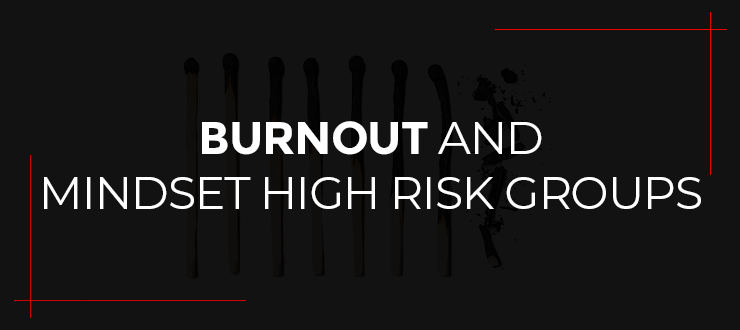As September 2020 rolled around I was wrecked.
The past four months had been a whirlwind of hosting 15 mastermind groups, coaching 22 individual clients, and creating and delivering a 4 week 1-to-many coaching program.
It was a lot.
My wife looks back at those times and says "You were literally dragging your feet up the stairs you were so tired."
Despite her accurate observation, I ignored the warning signs that burnout was around the corner.
I view myself as a smart guy, so why wasn't I willing to accept the importance of these warning signs?
Simply put, because I'm the kind of person who's at high-risk for burnout. The kind of person who ignores the warning signs of overdoing things until it's too late... And I have the history to prove it.
Whether it was swearing off fun and any social activity for 4 years while I was focused on competing in Brazilian Jiu Jitsu, causing myself physical injuries because I wasn't able to take a rest day or working unsustainable hours and saying yes to anything and everything when building my business.
These all should have been obvious indicators that I am in a high-risk group for burnout because of my unrelenting tendency to over-do everything, but I never wanted recognize that.
But this September I had no choice. With all the other factors of 2020 along with the loneliness and added stress of building a new business, I hit total burnout.
I had constant headaches, neck aches and my usual relentless drive turned into a "I just want to get through this week".
Luckily my wife decided to crack the whip and booked us a week long vacation at a beautiful resort (Covid discount prices are a beautiful thing).
That break was what I desperately needed, but was too bull-headed to recognize.
A couple days into the vacation my headaches started to fade along with the pain in my neck.
And while this was great, I also realized that hitting total burnout and then taking a week off isn't a sustainable solution... or a luxury I could depend on having.
I also realized that I actually would have been much more productive if I hadn't pushed myself so far beyond balance.
So the question was, how could I catch this in the future before it would be too late?
The 4 Step Process
While on vacation, a question I repeatedly asked myself was -
"How can I avoid my natural tendency to go overboard and catch myself before I burnout?"
It was a tough puzzle to solve.
However with Covid ramping up, something clicked.
I kept hearing about high-risk groups. How there are certain groups of people who need to adhere to certain medical recommendations due to their pre-existing factors or conditions.
It got me thinking...
What if there are various "mindset high-risk groups"?
What if there were clearly defined guidelines of what each of us should be aware of from a mindset perspective.
Wouldn't that be super valuable?
After a bit of research and thinking I recognized that this wouldn't be that hard to do. All we need to do is ask ourselves:
- What mindset high-risk group do I belong to (we all have at least one)?
- What situations or factors trigger my negative mindset pattern?
- How I could mitigate or avoid those situations?
- What do I do if I'm already in the red zone?
Bringing Awareness to Our Defaults
The first step to being able to recognize our mindset high-risk group is to ask ourselves what repeatedly holds us back from achieving peak performance.
For some of us, our inability to stop or rest could be holding us back from real success, for others it could be procrastination.
It can be something like imposter syndrome - where we're at high-risk to shy away from certain situations because of discomfort, or overconfidence - where we're at high risk to make foolish decisions because of a lack of humility.
Or perhaps there's a specific subject that causes us anxiety. Maybe we're a part of a money high-risk group where the subject of money and finances causes panic and overwhelm and disables us from making logical decisions.
The good news is that regardless of where our struggles lie, bringing awareness to them is half the battle.
If we do nothing else but give ourselves the ability to say "Ahh, I know I'm in a mindset high-risk group for X. I need to be extra vigilant because I am currently in a situation where this usually pops up..." it can do wonders for our performance and success.
But if we're serious about achieving sustainable peak performance, then after discovered our mindset high-risk group we need to ask ourselves the following 3 questions:
- What situations or factors trigger my negative mindset pattern?
- How I could mitigate or avoid those situations?
- What do I do if I'm already in the red zone?
Examples of high-risk groups:
Burnout High-Risk Group (my example)
Basically anything involving competition.
In BJJ this was against other people. In business this was against my own goal of trying to hit 6 figures in my first year.
- Remind myself that I'm not playing zero sum games anymore.
- "Nothing will happen if you don't hit your goals 100% of the time."
- Preschedule and set in stone workout times and nap times.
- Avoid waiting to take breaks only "When I need to" since people in the "burnout" high risk group are naturally terrible at this and always find an excuse to keep going.
- Have Saturdays blocked out as rest days
- Pre-plan longer breaks. Before we checked out of the resort I made sure to book another week-long vacation 4 months in advance.
Learn to listen to the high command, aka the wife, and accepting that if she says that I need a break, she's probably right. So even if I don't feel like it and even if I feel that I can keep pushing, I should put my ego aside, listen and take a recovery break.
Procrastination High-Risk Group
Whenever I don't have clear goals or strong enough motivation or when there's nothing or no one to hold me accountable.
- Reverse engineer what I really want out of life into a proper step by step strategy with clear goals.
- Have set in stone time blocks for when I need to do certain important and uncomfortable tasks and frame them around cues and rewards.
- Create some sort of accountability structure. Whether it's some sort of an accountability tracker for myself or an accountability buddy.
- Avoid the things I usually tell myself like "I can get it done tomorrow", "It's not a big deal" etc.
If I'm really struggling I should reach out to a friend, colleague or a pro and get outside help.
Imposter Syndrome High-Risk Group
Big social gatherings or anything where I have to be around people who I respect or admire.
- Before these events remind myself that imposter syndrome is a fallacy and that everyone gets insecure.
- Ask myself if this is a logical concern I have or an emotional fear of mine and get to the root cause of it.
- If that fails I'll ask myself will I decide to do what's scary, but will help me achieve more long term success, growth and internal happiness or will I choose comfort and suffer the pain of regret?
Remind myself what kind of person I want to be and have a ready made mindset cue card of how this person would behave in this situation and decide to take action.
What's Your Mindset High-Risk Group?
So take this time to ask yourself "What negative mindset pattern often holds me back from achieving success? What mindset high-risk group would I place myself in?"
Then follow it up with these 3 questions:
- What situations or factors trigger my negative mindset pattern?
- How I could mitigate or avoid those situations?
- What do I do if I'm already in the red zone?
P.S. I'd love to hear what your mindset high-risk group is!
Feel free to share them in the comments below or shoot me an email if you'd rather do it more privately.

